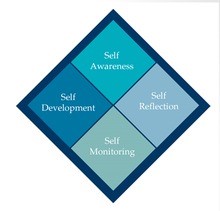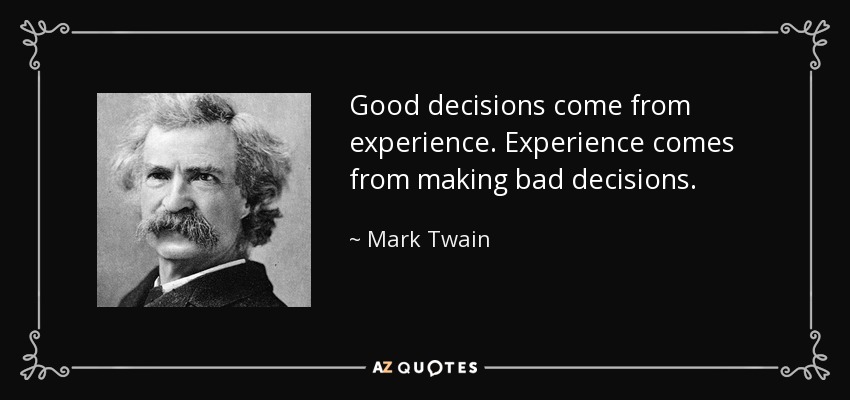Click here to return to Blog Post Intro
Jesus’ idea of greatness revolves around humility and service—a far cry from our typical associations with this concept. Leaders who have an appropriate view of self (humility), combined with the capacity to help others (service) are crafted over time. They practice being great. Extraordinary character and exceptional competence develop over time. Leaders must make countless good choices and right calls to fashion greatness. Practicing greatness requires that the spiritual leader develop seven key “disciplines”.
1. Self-Awareness
The single most important piece of information a leader possesses is self-awareness. The discipline of self-awareness is most important because it protects leaders from being self-absorbed or merely role-driven. Self-awareness includes:
- Self-knowledge: Knowing who you are. The point of leaders’ understanding their own cognitive styles is not just for self-knowledge but also to help leaders appreciate the preferences of others. Otherwise, they may tend to impose their own style of thinking on others, believing that others begin their thinking at the same point they do and process information the way they do.
- Self-mindfulness: Understanding your motives for doing what you do
- Self-vigilance: Knowing what makes you tick and what ticks you off!
- Self-consciousness: Knowing how you come across to others
- Self-alertness: Maintaining your emotional, physical, and spiritual condition. Many spiritual leaders discover that they get into psychological, emotional, and spiritual distress because they have inappropriate boundaries.
2. Self-Management
The discipline of self-management acknowledges that great leaders are great managers, not just of others but, primarily and foremost, of themselves. Leaders must learn to own their emotions so they can manage them rather than let emotions be in charge.
Many spiritual leaders are racked by fear—fear of losing leadership, fear of losing income, fear of losing favor, fear of not being obedient to God, fear of not realizing dreams. The enemy of our souls loves to whisper fear in our ears…but fear can be managed.
Behavioral scientist and journalist Daniel Goleman contends that only one-third of a leader’s effectiveness lies in the areas of raw intelligence and technical expertise. The other two-thirds comprise the dimensions of what Goleman calls emotional intelligence, which include qualities such as self-awareness, impulse control, persistence, zeal, self-motivation, and empathy…or, self-management.
3. Self-Development
The discipline of self-development characterizes all great leaders, who are marked by two key practices:
- They pursue lifelong learning. Lifelong learning actually means lifelong unlearning. Our capacity to grow rests on our willingness to put yesterday’s ideas, attitudes, and approaches under the knife of new insights and new challenges. Regardless of style, all leaders who engage in lifelong learning evidence two characteristics: they are intentional about it and they are curious. These leaders’ learning journeys are designed to expose them to new ideas.
- They build on their strengths. Great leaders differ from good leaders, in part, because of the degree to which they have developed and built on their strengths.
Mark Twain once said of an acquaintance who had passed away: “He died at thirty; they buried him at sixty.” Don’t die in place! Keep learning, focus on your strengths, and grow through failure.
4. Mission
The discipline of mission honors the propensity of great leaders to give themselves to great causes. Most people, even leaders, typically define themselves in terms of jobs, position descriptions, roles. In fact, when asked what they are about in life, they respond with, “I’m a _______________ (fill in the blank with some line of work)” or “I work at _______________ (some company or organization).” Great leaders, on the other hand, tell you what they are intending to accomplish, the mission they are on. “I am working to change _______________” or “I am investing my life in _______________ in order to _______________.” These leaders speak in terms of contribution, of significance, of changing the world.
Spiritual leaders need to distill out the core—the essence—of their call from God. Some key questions might help provide some clues:
- What people or cause do you feel drawn to?
- What do you want to help people do or achieve or experience?
- How do you want to help people?
- What message do you want to deliver?
- How do you intend to serve or have an impact on the world?
- Why did you say yes to God to begin with?
The truth is, God has not called you to your life mission in spite of who you are; He has called you precisely because of who you are. Leaders who are pursuing God’s mission for their lives enjoy abundant energy—both in themselves and among those in their leadership team. The mission creates an energy supply that powers the leader through challenges and fills his or her sails when the trade winds are favorable.
5. Decision-Making
The discipline of decision-making sets great leaders apart from good run-of-the-mill leaders.
Great leaders know how to make decisions, when to make decisions, and what decisions need to be made. They exercise consistently good judgment.
The ability to ask the right question requires that spiritual leaders spend more time thinking beyond the presenting problems, peering under the hood, so to speak, to see the real issues. They must be willing to challenge the status quo and to be ruthless in their analysis of both the situation and the results.
Great leaders understand the importance of timing, specifically when it comes to making decisions. There are right times to consider issues and right times to make moves. Similarly, a decision that is not effectively executed becomes a waste of leadership resources. Therefore, it makes great sense to involve in decision-making those people who will be doing the work and making things happen.
As a result, great decision makers seek out the involvement of the people who will live with the decision. Their perspective may be entirely different from those charged with making decisions.
6. Belonging
The discipline of belonging characterizes great leaders’ ability to enjoy significant relationships that nurture their lives.
Studies of spiritual leaders note that those who consistently work more than fifty hours per week frequently suffer relational deficits with families and friends, or both. Wearied and exhausted by the press of leadership responsibilities, we often do not have the energy to devote to developing or nurturing friendships. This is another reason leaders need to guard their boundaries and manage their calendars to guard against over-commitment.
Leaders with children have one primary responsibility toward them, beyond the inherent tasks of protection and provision: children need our blessing. Blessed children are affirmed in who they are and believe themselves to be hopeful promises of positive contributors to the world. They come to this belief because they have been instilled with a respect for God, their parents, and other people. Blessed children have been challenged to accept responsibility. Parents who bless their children prepare them to be a blessing to others.
The leader’s decision to share his life with his team does not mean that the leader will be everyone’s best friend. This is not only impossible; it is undesirable. But the best teams are those who feel a sense of bonding, of sharing life around a shared mission.
7. Aloneness
The discipline of aloneness celebrates great leaders’ capacity not only to endure the loneliness of leadership but to actually build solitude into their lives. Leaders who achieve greatness appreciate the depth of soul making that is possible only in solitude.
One of the reasons Jesus was distressed with the Pharisees centered on the way they had subverted Sabbath by turning it into activity, into an obligation, into a burden for people and away from a refreshing encounter with God designed to further intimacy with him. Jesus said Sabbath was intended as a gift for us. Use Sabbath however you need to as a strategy to debrief life and to enjoy God. If we honor the Sabbath, we take time to debrief our decisions, our attitudes, our relationships, our leadership, our goals, our achievements, and our challenges. This is a key reflection exercise for spiritual leaders who want to see their life and leadership from God’s vantage point.
It can help to fix the idea in your mind that time for solitude is a key responsibility that must be scheduled and observed. If the leader considers this time a luxury or something to engage in after other responsibilities are discharged, the leader will not set aside enough alone time. There are simply too many other demands that will always clamor for your time. The smart leader figures out the rhythms of time demands and schedules solitude appropriately.
During solitude, journaling can be an important activity. Recording your thoughts requires a leader to engage in reflection and analysis, and to take an inward journey of discovery. I know I was advised to begin journaling my observations of leadership—in both what I read and what I observed—more than 10 years ago. Now, those writings have become fodder for my “Out of This World Leadership” blog!
McNeal’s book ends with this exhortation, “If you decide to go for greatness, it will cost you everything you have and are. You will have to surrender your life. You will no longer belong to your personal dreams and petty agendas. Your days and years will belong to the One who believes in you so much he has risked his agenda on you. You will die first, only to discover this is the way to life. The choice is momentous. Amazingly, it is yours to make. Choose greatness!”




